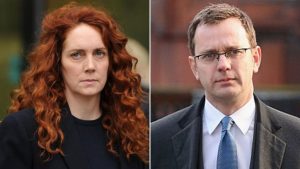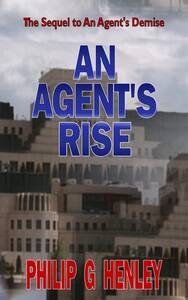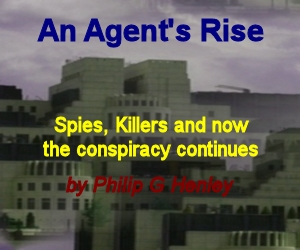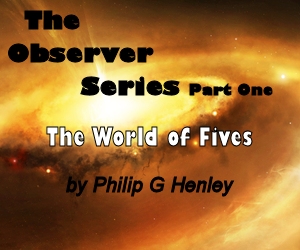Freedom – Not For Coulson was published in July 2014
I have been ruminating further on the nature of freedom, which should be clearly on Andy Coulson’s mind after his verdict and jail sentence. I again refer you to the excellent coverage provided by The Drum, web site.

Rebekah Brooks and Andy Coulson
Freedom from incarceration is clearly a very practical demonstration of the term as is freedom from state persecution. Many in the written media have commented on the limitations to freedom that the Leveson Inquiry has provoked. At the same time the press/media has imposed limits on the freedom from invasion of privacy of public and not so public figures. The hounding of individuals by the media (and it is not just the press and paparazzi – who is filming them?) in pursuit of a story is clearly of interest to the public, but as many have said it is not necessarily in the public interest.
I have blogged before about the revelations from Snowden of surveillance on the general public. These have a double twist on freedom. The freedom of the public to live without the danger of a terrorist attack has to be balanced against the freedom from state surveillance and the fear of such an attack. It is not an easy balance or an easy judgement. Even liberal (small l) politicians have at times imposed restrictions on freedoms. These could be a CCTV camera recording all comings and goings at a school in the belief that this will prevent a child abduction. To help deter or prevent such events most schools now have CCTV recording every visitor and delivery, just in case. All of us, on such a visit, are assumed to be potentially guilty and therefore our movements must be recorded.
Of course, in reality CCTV prevents nothing; Some of the time it may produce an image that may indicate something happened after the event. The rise of CCTV is an example of a surveillance state and a population which is scared or I should say encouraged by the media and politicians to feel scared. Prosecutal authorities want evidence of something happening after the event rather than preventing it happening. CCTV may increase the conviction rate but does it actually stop a crime being committed, whether petty vandalism or a more serious event? It is supposed to have a deterrence effect, but the largest growth of CCTV is in hidden cameras and private systems. This data is supposed to be registered with the Information Commissioner and the images are subject to the Data Protection Act unless they are purely for private means protecting private property. If you record the public street you are not recording private property but the passing general public.
Despite the growth of surveillance by the state and others, some elements of the media would have us believe that there are paedophiles and murderers everywhere, and that terrorists are planting bombs on every street corner. The terrorism facts for deaths in the UK, excluding in Northern Ireland, are 1970’s – 48, 1980’s – 307 (270 in Lockerbie), 1990’s – 18, 2000’s – 56 (all in the London bombings of 7th July 2005). Since then, thankfully, there has only been one, the murder of Trooper Rigby. This does not include the thousands injured over the years or the failed attacks. Is this because the security services and the police are very good, or just that there is not as great a threat as some would have us believe?
Contrast this with the threat of death from a car accident. Annual deaths, not decade totals, 1970’s- 7,499, 1980’s – 5,953, 1990’s – 5,217, 2000’s – 3500 reducing to 2,200 and so far reducing again in 2012 to 1,754. These numbers dwarf terrorism but we haven’t banned driving! Yet the budget for counter terrorism far exceeds that for road safety. Who are we protecting, and from what?
The headlines and statistics are designed to scare the population into believing that security measures are absolutely necessary. We must restrict freedom by introducing surveillance systems with carefully worded legal get out clauses that avoid oversight and scrutiny. We have masses of CCTV camera everywhere, and now we have black boxes being offered in cars so that the insurance company can track how many miles you drive at what speed and where. This is proposed as a way of reducing your premiums. How long before its primary use is to deny a claim because you were driving 1 mph over the speed limit 2 minutes after the insurance time curfew.
Meanwhile, the police can now request that data from the insurance company as evidence or just as part of a warranted or non-warranted investigation into something completely different. Of course you are not guilty of the crime that happened on the car route, but now your DNA is on file, alongside your fingerprints and the note on the police computer for eternity that you may have been a suspect or in the vicinity of.
I was massively against National ID cards because I felt that it was a complete change to innocent until proven guilty. It is not for me to prove who I am walking down the street minding my own business. Currently in UK law it is not a criminal offence to give a false name to the police until charged. With ID cards, failing to give a valid ID would have become an offence. Yes ID cards may have been convenient, but loss of freedom isn’t about convenience. Stop and Search as used and abused against the ethnic population demonstrates how badly some current laws are used.
If we examined the number of arrests for terrorism as opposed to the number of convictions we have the same mind set from the police and the emerging surveillance state. The enforcement of ever more identity checks, stopping innocent individuals taking photos in London, airport security etc, is a colossal waste of resources which rarely if ever prevents an act. It does succeed in terrorising the population though in the form of scaring the public into accepting further curtailments of their freedom. These are dressed up as preventing crime or terrorism. In all the recent attacks around the globe the security services had some of the individuals under surveillance or knew what was going on. Of course if there are no terrorist attacks then how can the security service and police justify their budgets and the new laws they require to prevent further terrorist attacks.
Freedom is chipped away at our peril. One inch at a time, one adjustment of the law, one expansion of the law to cover a purpose for what it was not intended. For example extradition rules to the USA were change to help in terrorism cases. Their first use was for financial crime. The use of RIPA by local government to prevent dog fouling, I’m sure that was uppermost on the then Home Secretary’s mind, but the use continues, it has not been stopped. It saves of course the local authority from employing a dog warden, extra police or providing bins for dog walkers. They would need to be emptied. There are very few litter bins in London because once, in Warrington the bins were used for an IRA bomb causing the tragic deaths of two boys. As a consequence many bins were removed they have never returned. Now we have more litter as an unintended consequence of a counter terrorism measure. Are we safer?
The ability to say, act and do things which are offensive, obnoxious or just stupid is as much a part of freedom as voting but given that 65% of the voting public can’t be bothered I don’t hold up much hope for freedom. Nothing to hide nothing to fear is normally advocated by those that believe we need more security. Despite my blogs I still like my privacy, especially by unwarranted intrusion. I do not want private companies phoning me wanting to sell me stuff or falsely asking if I have had an insurance claim. Nor do I want the state endlessly checking my email or filming me wherever I go, just in case something somewhere connects me to something else. If my third cousin fifteen times removed once looked at a Jihadist web site. Does that make me a legitimate target for surveillance? If Snowden is to be believed then the NSA/GCHQ etc already know that they just might not have checked the details, but they would have the meta-data of a connection. But of course reading about Jihad, other political and religious beliefs can be considered an act of terrorism seen as preparing for an act or just promoting extremism.
Lady Chatterley was once banned because it was considered obscene now we ban web sites because they promote a belief and accessing such a web site is considered as preparation for an act of terrorism. Where is Freedom of Speech in this debate? I consider many political party web sites to be obnoxious, wrong and encouraging the wrong behaviour. Where they advocate repealing or changing the law are they not advocating potentially criminal acts and accessing them could be a criminal act? In the amount of misquoted statistics, headline promoting facts which are rarely taken in context I am surprised the Advertising Standards Authority does not take them to task.
In the last few days England’s abject football performance received more detailed coverage that the Coulson, Brooks, et al, trial. The headlines of that trial have been used by the media to portray themselves as innocent and acting in the public interest, and therefore to undermine the politician’s case for press restrictions. There was little or any comment about real freedom, only the press’ freedom to continue to print their stories which are rarely if ever in the Public Interest. The hacking trial rarely if ever covered that because the Editor of a national newspaper was more interested in the sex life of a politician. There is almost no analysis of the evidence or the wider implications.
There were greater headlines about the affair between Brooks and Coulson than there was about some of the key evidence e.g. the hacking of the Home Secretary’s phone something that Coulson admitted in the witness box but still pleaded not guilty to. He did not claim public interest for divulging the details of another conniving politician. How come the security services responsible for the security of the Home Secretary did not prevent that, or perhaps they knew but decided to keep the secret to themselves ready for the next discussion on budget. One editor guilty and one editor not guilty does not give either side in press freedom a leg to stand on.
The press was exposed as not an arbiter of freedom but as what they are. Private companies desperate to generate revenue regardless of the legitimacy of the story. They were willing to publish anything from any source, truth, freedom to privacy had little to do with editorial decisions. Much of the hacking and other investigations was designed to hinder other media rivals. Denials were to prevent stories in other papers. The News of The World was exposed but what of the other papers all meekly claiming they had nothing to do with it and using the trial to hammer their News International Rival. Have their actions extended press freedom?
Where are their investigations into press misbehaviour? Do we have to wait another ten years for other press misbehaviour to be exposed or another policing scandal. Which policeman shut down the hacking investigation and why? Who asked him/her to stop? Who is holding the prosecution service to account? Not the politicians and certainly not the press. Don’t ask because then you will become the investigated by the media and by the state. But then again we can protect the children and keep us all safe.
One last thing on Coulson, Ed Milliband has accused David Cameron of employing a criminal. He is a convicted criminal now, he wasn’t then – remember innocent until proven guilty. One freedom does remain constant, never let the truth get in the way of a politician’s freedom to smear another individual sometimes even of the opposition party!






